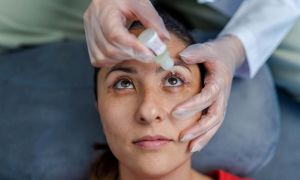Advertisement
Blue discoloration of the whites of the eyes is rare and occurs when there is abnormal thinning of the sclera, which is the white outer wall of the eye. Most cases of such blue discoloration occur in young children with rare severe congenital abnormalities of the musculoskeletal system. Some patients with Marfan's syndrome, a congenital condition that may not become apparent until teenage years or later, may show a bluish discoloration of the whites of the eyes. In older individuals, there may be bluish or grayish areas of thinning of the sclera near the inner or outer corners of the eyes where some of the muscles that move the eye are attached to the white of the eye; such thinning is benign and requires no treatment.
Continue Learning about Eye and Vision
Important: This content reflects information from various individuals and organizations and may offer alternative or opposing points of view. It should not be used for medical advice, diagnosis or treatment. As always, you should consult with your healthcare provider about your specific health needs.




